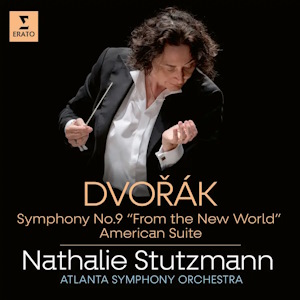
Antonín Dvořák (1841-1904)
American Suite Op. 98 (1894-95)
Symphony No. 9 Op. 95 “From the New World” (1893)
Atlanta Symphony Orchestra/Nathalie Stutzmann
rec. live, 9 & 11 November 2023, Atlanta Symphony Hall, Atlanta, USA
Erato 2173 226379 [64]
Despite having made more than eighty recordings as a singer and singer/conductor, this is Nathalie Stutzmann’s first symphonic recording, made at the end of her first full year as music director of the Atlanta SO. The choice of symphony here is a bold one, give the sheer number of great recordings in the catalogue; my own favourite is by Fricsay with the BPO, but names such as Suitner and Kubelik must also crop up when the best recordings are being discussed – although there can surely be no such thing as a “best” recording, just many excellent ones.
It is now generally accepted that despite the obvious influence of pentatonic Native American music and of Afro-American spirituals, the inspiration for Dvořák’s melodies in both works here derives as much from Czech folk tunes, too; the music is a melding of the New and Old Worlds, reflected by the evidently harmonious pairing of the French conductor and Deep South orchestra here.
I began my first audition of this new recording with a straight comparison of its first three minutes with those of the classic Fricsay version. Before I make any musical observations, I should mention that just as there is a little tape hiss in the 65-year-old recording, a modern, live, digital recording still picks up a bit of ambient hall noise, so the sonic/engineering differences between them aren’t that great, especially as DG did such a really great job in the famous Jesus-Christus-Kirche all those years ago. Nor are the interpretative differences so great either – at least at first. The slow introductions are very similar: Fricsay is a touch more expansive and flexible than Stutzmann, who is a little more urgent at the start of the ensuing Allegro molto sections with the rallying horn cry. That signals her overall approach throughout the symphony; although she encompasses the lilting lyricism of the slower, quieter passages, in general, she aims more for propulsion, whereas Fricsay engenders a kind of songfulness, almost operatic in style, where she favours a more linear, instrumental manner. As such, she has no difficulty holding the structure together and the peroration of the last minute is thrilling. Despite her urgency, her first movement is two minutes longer than Fricsay’s because, unusually, she takes the repeat – and I don’t mind hearing such music again, especially as it underpins Dvořák’s desire to adhere to classical form.
She is also rather less expansive in the Largo: a minute and a half faster than Fricsay and perhaps less inclined to let the cor anglais solo court sentimentality, as its melody is now so familiar to us. (Indeed, Stutzmann is in fact swifter in the two final movements, too, by a minute and half a minute respectively, again, aiming to avoid wallowing.) I prefer the wirier tone of the Berlin instrument to the mellower American one, but both are beautifully played. The standard of orchestral playing today is so high and the clarity, depth and balance of modern recording technique so satisfying that there is nothing to fault here, despite it being live – nor is there any audible coughing. The audibility of the bassline is very welcome and the silky strings and sonorous brass of the last couple of minutes create a magically serene conclusion to the movement.
The Scherzo is fiery and driven with splendidly prominent timpani, the trio tripping and dancing, flutes fluttering like the aural equivalent of coloured pennants waving in the breeze before the return of the pounding “Hiawatha” theme. As with the ending to the first movement, Stutzmann has the knack of maintaining tension; that flows through to the opening of the finale and that whole movement crackles with an electric energy throughout before an appropriately emotionally ambivalent coda.
I reviewed a good re-issued recording of the American Suite – coupled with the Sixth Symphony – early last year, remarking that it was not “most striking of Dvořák’s works; it is, in essence, “Dvořák light”, and I have no cause to revise that response. Having said that, it is as well played here as anyone could wish. The Atlanta orchestra make the most sumptuous, upholstered sound in the opening Andante con moto, the Allegro has first an alluring swing, then a pounding insistence. The Moderato alla polacca seems like an elegant close cousin to a movement from one of Tchaikovsky’s ballet suites; the second Andante features some dreamy woodwind playing and the final Allegro makes a fitting climax.
All in all this a most promising sign of a fruitful collaboration between a great American orchestra and a conductor whose grasp is firm, coherent yet also sensitive and highly musical.
Ralph Moore
Buying this recording via a link below generates revenue for MWI, which helps the site remain free




















